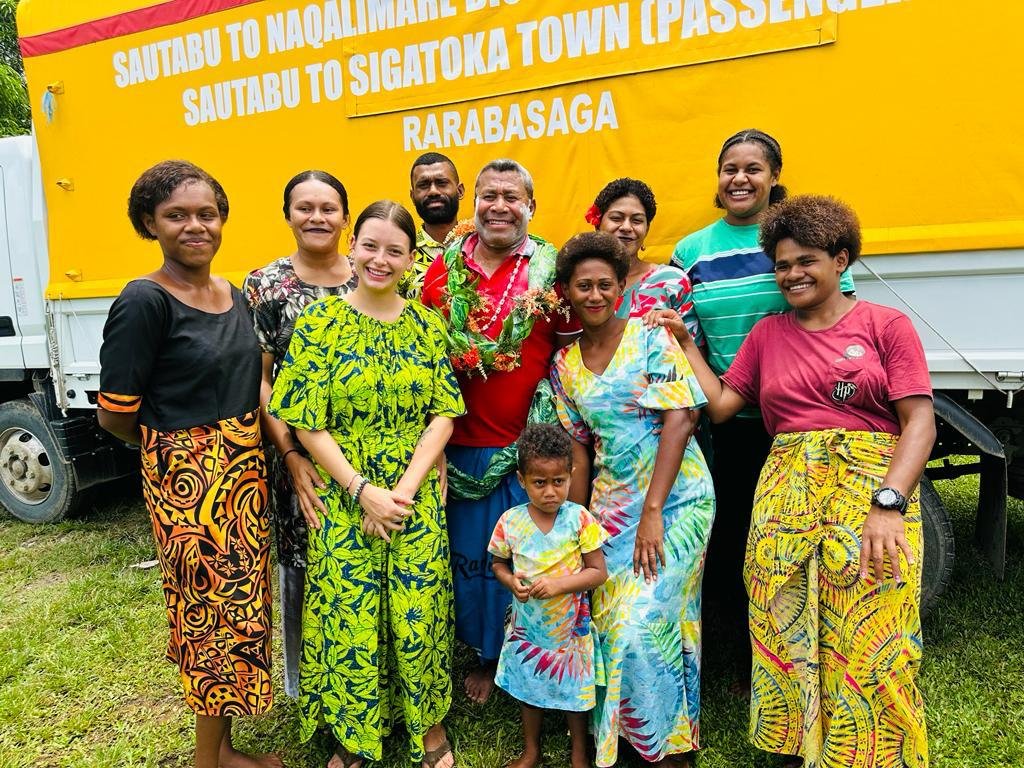Fiji, a small island nation in the South Pacific, is home to light-hearted and caring people. It is characterized by white sandy beaches and crystal clear water, but this stereotype only scratches the surface. Deep in the interior highlands lie hundreds of tribal villages. These communities rely on agricultural-based farming economies. Communalism is at the core of Fijian culture. Villages do everything together- farming, cooking, and eating. Even naps are taken together, in the hotter parts of the day each afternoon. In this interior region, spread over 20 acres, Sautabu village is nestled in the Sigatoka River Valley.
Sautabu lies in the interior highlands of the Nadroga Province. The community has around 200 members, half of which are children and vulnerable elderly people with mobility limitations. Families often work together to care for their dependents; mothers frequently take turns watching children so that other chores can be done. Able-bodied men spend mornings and afternoons on the farm most days. Women take goods to sell in the markets on Fridays and Saturdays. Sundays are typically a day of rest, spent with families in gratitude.
Every November through April, extended periods of flooding cause prolonged power outages. Being located deep in a valley, this can make nighttime very dark, and very hard. In times of flooding, this causes great risk to villagers and their dependents. Lack of power can lead to transportation and communication issues which is dangerous during extreme weather events. Being able to move freely, regardless of the weather conditions, increases personal safety and improves local’s quality of life.
The sustainable solution of solar street lights is proposed by the village project committee, including the Turaga ni Koro (government village head), Taniela Nacalucalu, and trustees Adi Ema Kunawaqa and Mereadani Tuvou.
Project Objective:
To install solar street lights. This will empower the community by providing equitable access, increase market participation, and raise household income. Additionally, this sustainable option will offset the community’s power costs and be critical emergency infrastructure in the event of prolonged power outages. By prioritizing these results, we aim to create a more equitable and resilient community.
Budget:
All costs in FJD
Binding wire 8kg = $26.00
Wheel Barrow x 2 = $370.00
Cement x 40 X 25kg bags = $760.00
LED Solar Street Light 200 W x 20 = $3,600.00
Galvanized Pipe x 20 = $1,200.00
Welding x 20 lights = $600.00
Signage Board x 1 = $90.00
Transportation x 1 delivery truck = $30.00
Miscellaneous = $291
Total Cost FJD $6,967
Cost AUD $4,774
Cost USD $3,000
Should we raise the necessary amount to complete this project we will use any remaining money for concrete footpaths.
Labour
Project Lead will be Mata ni Tikina (Village Headman) and as a sign of goodwill, everyone will help where they can. Preparing food, digging, wheelbarrowing, leading, and monitoring safety, free of charge, for the betterment of their community (Solesolevaki a.k.a).
The installation of solar lights will:
Provide lighting during power outages to reduce the unknowns during weeks of long storms
Keep people safe by enhancing visibility and, therefore, preventing injuries during prolonged power outages
Floodproof solar lighting will increase the climate change resiliency in the village (and facilitate conversation around climate resiliency)
Lower electricity costs
This means all community members—men, women, and their dependents—can navigate the community when carrying goods to market
Facilitate efficient movement throughout the village
Allow for more community gatherings after dark
Solesolevaki
The idea of working together or solesolevaki is deeply rooted in Fijian culture. The labor will be provided by able-bodied men. They will meet daily, led by the Project Lead (a certified carpenter), to ensure project efficiency and communication. Their meals will be kindly provided by the women’s group. This is an opportunity for skills development among villagers in project management, knowledge of construction techniques, and renewable energy technology installation and maintenance.
Transparency
The assigned trustees, Adi and Mere will keep receipts in paper form and send them to Mates Fiji digitally to keep track of the funds. At the end of each week, the project committee will meet with the Turaga ni Koro and workers to discuss and review the quality of the work completed that week. This way they will be able to make any amendments and resolve problems to prepare for the next week of work.
This project was designed in collaboration with the village to find the most sustainable solution. Mates Fiji is providing the copyright and platform - because Sautabu had approved funding from USAID, but due to a federal foreign aid spending freeze by the US government executive order, it is unclear whether or not they will receive funding.
We promise to Do No Harm.



